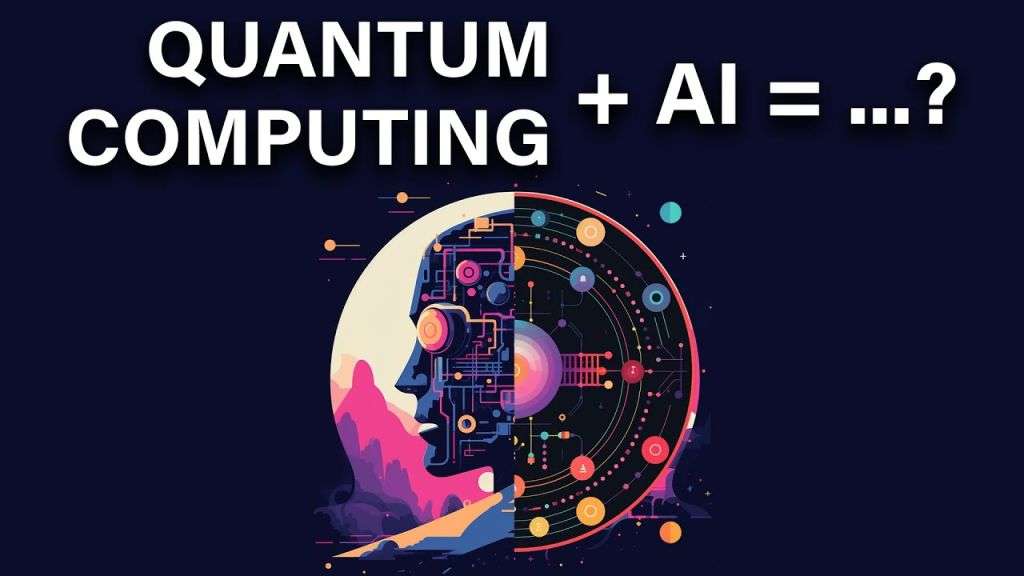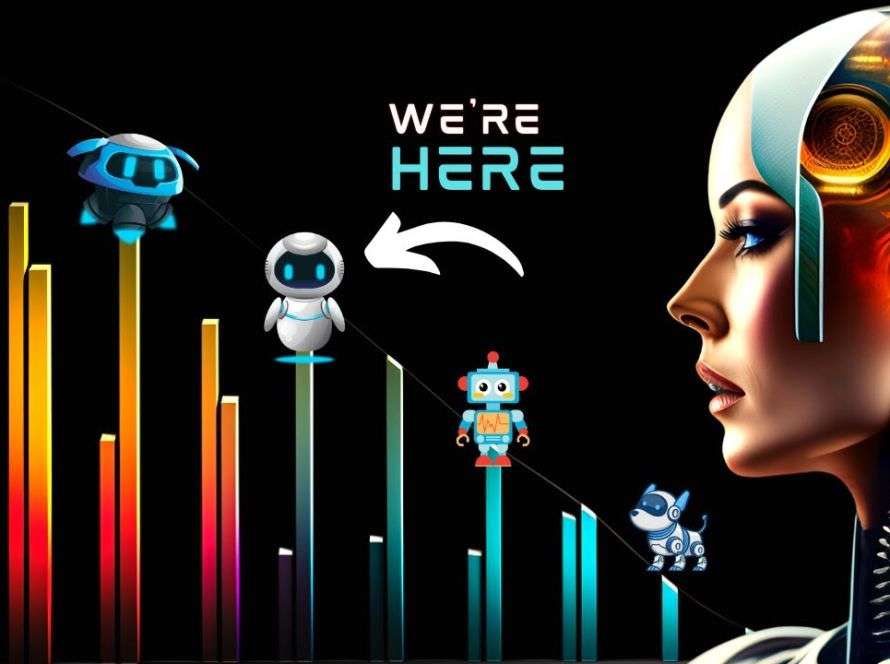Imagine stepping into a realm where the lines between the unimaginable and the achievable are not just blurred, but erased. “Here’s What Will Happen When We Combine Quantum Computing With AI!” is your video guide to an extraordinary fusion of technologies that promises to catapult us into a new era of innovation. Your journey through this video will reveal how the intertwined powers of Quantum Computing and AI are set to revolutionize everything from machine learning to our very understanding of the cosmos.
You’re about to be taken on a whirlwind tour through the potential impact and real-world applications of these combined technologies. Get ready to grasp the complex principles of superposition and entanglement, while gaining insight into neural networks that propel AI forward. It’s a momentous exploration that considers both the unparalleled benefits and the pressing challenges, such as securing data and navigating ethical concerns, that such advancements might bring. Join us as you discover a future crafted by the convergence of Quantum Computing and AI, a future that hovers on the edge of science fiction.
Understanding Quantum Computing
The Basics of Quantum Mechanics
Before you dive into the nuances of quantum computing, it’s essential to grasp some fundamental aspects of quantum mechanics. You see, the quantum world operates under different rules compared to the classical world you’re familiar with. At its heart, quantum mechanics describes the peculiar behavior of particles at a microscopic scale, where things can exist in multiple states at once and actions can have an instant effect over vast distances.
Principles of Superposition and Entanglement
The principles of superposition and entanglement are the two pillars that give quantum computing its edge. Superposition refers to the ability of quantum particles, like electrons or photons, to be in multiple states simultaneously. Imagine you’re flipping a coin, and instead of landing as heads or tails, it’s in a state where it’s both at the same time – that’s superposition for you.
Entanglement, on the other hand, is a strange connection between particles where the state of one instantly influences another, regardless of the distance separating them. This concept is so counterintuitive that it baffled even Einstein, who famously dismissed it as “spooky action at a distance.”
Contrast with Classical Computing
Now, how does all this contrast with classical computing? The key difference lies in the basic unit of computation. Classical computers use bits, which are like tiny switches that can either be in the off (0) or on (1) position. Quantum computers use qubits, which, thanks to superposition, can be in a kind of flexible state that’s both 0 and 1 at the same time. What’s more, through entanglement, each qubit can be correlated with another, no matter where it is, which unlocks a new dimension of computational power.
Current State of Quantum Computers
As of now, quantum computers are in the early stages of development. They are incredibly powerful but also extremely delicate, requiring precise conditions like extreme cold to operate. You’re unlikely to find one in homes or offices anytime soon, but significant progress is being made in the field, and they’re already proving their worth in specialized applications.
Unveiling the World of AI
Evolution of Artificial Intelligence
Your journey through the world of AI begins with its evolution. From the early days of simple algorithms and pattern recognition to the current landscape filled with sophisticated machine learning models, AI has come a long way. It’s evolved to mimic human learning processes, constantly improving through experience – much like you might learn to master a new skill.
How Neural Networks Work
An integral part of AI’s evolution is neural networks. Picture your brain’s network of neurons – neural networks in AI operate on a similar principle. These networks are composed of layers of interconnected nodes that work together to process and analyze complex data. They can learn and adapt by adjusting the strength of the connections based on the input they receive, which is how they can recognize patterns or make decisions.
Machine Learning and Deep Learning
Machine learning and deep learning are two areas where AI really shines. Machine learning is like teaching a computer to recognize patterns and make decisions based on data, without being explicitly programmed for every possible outcome. Deep learning goes a step further, utilizing layers of neural networks to analyze data with even greater depth, leading to more nuanced and sophisticated learning.
Achievements and Limitations of Modern AI
Today, AI has achieved some remarkable feats, from beating world champions at complex board games to enabling real-time language translation. But it’s not without its limitations. Current AI still struggles with tasks that require common sense reasoning or adapting to completely new situations. Your challenge will be steering AI towards overcoming these hurdles, paving the way for even more groundbreaking achievements.

Integrating Quantum Computing with AI
Potential for Accelerated Machine Learning
By bringing together quantum computing and AI, you’re looking at the potential for machine learning processes to be accelerated like never before. Quantum computers can analyze and process vast datasets at incredible speeds, potentially reducing the time needed for machine learning tasks from months or years to mere seconds.
Quantum Algorithms in AI
Quantum algorithms are poised to open new avenues in AI development. Algorithms that are specifically designed to take advantage of quantum computing’s unique properties could lead to more efficient problem-solving techniques and allow AI to tackle complex scenarios that are currently out of reach.
Improvements in Data Analysis
Data analysis is another area ripe for a quantum leap. With qubits capable of representing myriad possibilities at once, quantum computers could sift through extensive datasets much faster than traditional computers, providing AI systems with the ability to make more accurate predictions and more effectively parse complex patterns.
Anticipated Milestones in Integration
Looking ahead, you can expect to see some significant milestones reached as quantum computing and AI continue to integrate. From machine learning tasks that benefit from the vastly increased speed to breakthroughs in understanding natural phenomena, the combination of these technologies holds the promise of incredible advances in numerous fields.
The Impact on Computation Speed
Exponential Increase in Processing Power
The leap in processing power you’ll witness when quantum computing becomes more widespread will be nothing short of exponential. Whereas adding more bits in a classical computer increases power linearly, each additional qubit in a quantum computer exponentially increases its computational capabilities. This is akin to you going from walking to instantly teleporting from place to place in terms of speed.
Real-time Data Processing
The potential for real-time data processing with quantum AI is staggering. Imagine health monitors that can instantly analyze and respond to biomedical data or financial systems that can execute trades at the first hint of market change. These systems would be able to process and react to live data streams with unprecedented speed, providing huge advantages in many industries.
Implications for Big Data
Big Data could be transformed as quantum AI allows for handling data on a scale that’s currently unmanageable. Every interaction, transaction, and digital footprint could be processed, providing insights into human behavior and economics that are currently beyond our grasp.
Challenges in Scalability and Reliability
Even with these impressive capabilities, challenges remain. Quantum computing must overcome issues of scalability, error rates, and reliability to become a practical tool in concert with AI. As it stands, maintaining qubits in a stable state, known as quantum coherence, is an intricate task, and quantum error correction is a complex yet critical field still in development.

Revolutionizing Machine Learning
Quantum Neural Networks
Considering quantum neural networks takes us one step further into the future. These networks would leverage quantum properties to perform complex calculations that are far beyond the capability of traditional neural networks, leading to new heights in AI’s ability to learn and adapt.
Advanced Pattern Recognition
Your current pattern recognition software is good, but quantum AI could be phenomenal. It would have the ability to recognize patterns at a level of complexity that we can hardly imagine, considering all variables at once – a feat that’s simply not possible with today’s AI.
Discovery of New Machine Learning Models
As quantum computing evolves, you can expect the discovery of new machine learning models that are uniquely suited to quantum processing. These models could unlock ways of processing information that lead to AI becoming more intuitive and versatile, closing the gap on tasks that currently can only be handled by the human brain.
Quantum Optimization for AI
Optimization problems, where you need to find the best solution from virtually limitless possibilities, are a perfect match for quantum computing. With AI’s ability to learn and improve, quantum optimization could see AI making decisions and solving problems in ways that optimize efficiency and outcomes to a degree currently unattainable.
Exploring Real-World Applications
Quantum AI in Healthcare
In healthcare, quantum AI has the potential to revolutionize everything from diagnosis to treatment plans. By analyzing medical data far more comprehensively and rapidly than ever before, Quantum AI could help healthcare providers diagnose conditions earlier and with greater accuracy, leading to better patient outcomes.
AI-Driven Quantum Simulations
AI-driven quantum simulations could unlock secrets of the physical world at the most fundamental levels. They could provide insights into materials science, leading to the development of new materials with properties that could, for example, make batteries more efficient or make materials stronger yet lighter.
Finance and Risk Analysis
The realm of finance and risk analysis is another area where quantum AI could make significant impacts. By processing market data at speeds unattainable today, AI could provide financial experts with predictive models that would allow for more informed and timelier investment decisions.
Environmental Predictive Modeling
Environmental predictive modeling could be transformed by quantum AI, providing more accurate forecasts of weather patterns, climate change, and natural disasters. This would not only allow us to better understand our environment but also provide critical information for disaster preparedness and response efforts.

Security and Ethical Considerations
Quantum Cryptography and Data Protection
As you venture into the age of quantum AI, quantum cryptography emerges as the new standard for data protection. It promises to protect information through quantum key distribution, which is theoretically secure against any form of computational attack – a massive step up from our current measures.
Potential to Break Existing Encryptions
However, the very same power that makes quantum algorithms so effective also poses a threat to existing encryption methods. Quantum AI may very well possess the capability to break through the security that protects vital systems, from national defense to personal financial information, necessitating a complete rethinking of digital security.
Ethical Use of Quantum AI
The ethical use of quantum AI challenges you to consider the implications of unprecedented computational power. What frameworks will ensure it’s used for the betterment of society? How do you prevent its misuse in areas like surveillance or autonomous weaponry? The dialogue around these questions must evolve as rapidly as the technology itself.
Data Privacy and Surveillance Risks
The escalated processing capabilities imply that quantum AI could enable more intrusive forms of data analysis, potentially leading to heightened surveillance and erosion of privacy. Balancing the benefits of this powerful technology with the imperative to protect individual rights will be one of your great balancing acts in the coming years.
Possibilities in Communication
Prospectives on Quantum Internet
The prospects of a quantum internet represent one of the most exciting developments in communication you can look forward to. With its potential for unfathomable speed and security, quantum internet could completely redefine how you work, play, and communicate, enabling a connected world previously only imagined in science fiction.
Entanglement and Secure Communication
Entanglement could serve as the backbone for future secure communication networks. By utilizing entangled particles, quantum AI could enable a level of communication privacy that’s inherently protected by the laws of physics – a true safe haven in the digital universe.
Impact on Social Media and Networking
The impact on social media and networking could be profound. Quantum AI could not only change the speed and way you connect, but also how these platforms analyze data and engage with users, creating more immersive and personalized experiences.
Interplanetary Communication Prospects
With quantum entanglement, even interplanetary communication becomes a tantalizing possibility. You could witness a time when talking to someone on Mars happens with the same ease as a phone call to a friend in another city, reshaping your sense of community and place in the universe.
Challenging Our Understanding of Reality
Digital Afterlives and Simulated Realities
Quantum AI could challenge your very notion of reality. With the ability to create simulated environments indistinguishable from the real world, you’ll face philosophical questions about existence and consciousness. Could simulated realities offer a form of digital afterlife? These are the realms of thought that quantum AI invites you to explore.
Manipulation of Time Perception
Quantum computing’s ability to solve problems almost instantly also influences the perception of time in the virtual realm. Could you experience full lifetimes within a simulated environment in what’s a blink of an eye in the real world? It’s a mind-bending prospect that may just become part of your reality.
Consequences of Self-aware Quantum AI
The development of self-aware quantum AI stirs up existential puzzles reminiscent of classic science fiction. The convergence of self-learning algorithms and quantum processing might lead to a form of artificial consciousness, leaving you to ponder the ethical and societal implications of creating a new form of intelligent life.
Blurring the Lines Between Physical and Virtual
As quantum AI matures, the lines between physical and virtual realities will become increasingly blurred. This could alter human experiences, from entertainment to education, and even to identity itself. How you choose to navigate and integrate these realities will be crucial to maintaining a sense of self and society.
Conclusion
Embracing the Quantum AI Era
As you look forward to the future, it’s clear that embracing the Quantum AI Era will be pivotal. It’s a time of tremendous potential, laden with opportunities to solve some of the world’s most pressing challenges and to expand human potential in ways unimaginable.
Balancing Innovation with Caution
However, with great power comes great responsibility. It’s vital to balance innovation with caution, to proceed with a measured approach that considers the ethical, societal, and security implications of this powerful merger between quantum computing and AI.
The Significance for Humanity’s Future
The significance of quantum AI for humanity’s future cannot be overstated. It’s a transformative technology that could redefine how you live, work, and interact with the world around you. The quantum AI era has the potential to surpass the Industrial Revolution in its impact on civilization.
Call to Action for Further Engagement and Learning
This is your call to action for further engagement and learning. Stay informed, participate in dialogues, and educate yourself and others about the developments in quantum AI. By being proactive in shaping this future, you ensure that the benefits of these extraordinary technologies are maximized for all.


